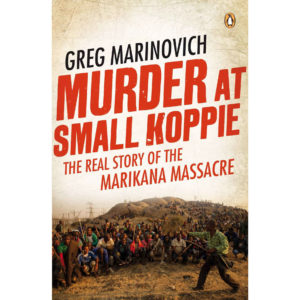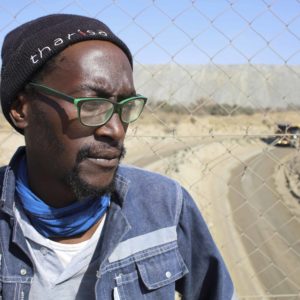Marikana: ‘A wound that will never fully heal’
The police killed Mathabang Ntsenyeho’s husband, the sole breadwinner, at Lonmin mine in 2012. Now she struggles to support her family while living with the pain of her loss.
Author:
16 August 2021

“I miss everything about him because we lived together for a long time, and losing him in such a painful way does not bring me any comfort. He was a family man who truly loved his children and would always teach them about the ways of life. It’s painful to revisit this trauma every year around this time. It’s like a wound that will never fully heal because I am constantly reminded of the pain,” says Mathabang Ntsenyeho née Nthoba, who now uses her maiden name.
Speaking in Sesotho, Nthoba, 50, says, “We had a deal that as soon as he safely got out of the mine every day, he would send me a ‘call back’.” Her voice breaks as the television blares in the background. On Thursday 16 August 2012, she did not get a “call back” message from her husband.
Ntate Motlalepula Andries Ntsenyeho, 42, had little chance of escaping the ring of police officers that surrounded and then hunted down mineworkers hiding behind boulders on the hill near Lonmin mine in Marikana, North West province.

Ntsenyeho was among those who went on a wildcat strike to demand a wage of R12 500 a month, triple what they were earning at the time. As a rock-drill operator, one of the lowest-paid jobs on the mine, he worked long, hot shifts in dingy underground conditions. Six months before this, miners at the neighbouring Impala Platinum mine embarked on a six week-long strike.
At the time of her husband’s murder, Nthoba lived with her five children in Sasolburg in a shack settlement with no electricity. He lived two and half hours away at a shack settlement in Marikana. She gathered most of the information about what happened that day from the radio. She last spoke to her husband at around 9am.
“He told me that he would be taking leave the following week to come see me, but for now had to go and take part in the strike. I asked him not to go to the strike, but he told me not to worry because he would see me the following week. He then told me not to call him again until he was back from the strike because when they are up there [at the hill] they will switch off their phones to avoid anyone trying to tap their phones, or being sold out by police informants on the mine,” she says. She held on to his last words, that he would call her.
Later, while watching the evening news on her cellphone, Nthoba saw that the police had shot miners. “I then switched on the radio and heard that … people had been killed in Marikana on a hill. This didn’t sit well with me. I couldn’t sleep that Thursday night waiting on his call,” she says, shuddering. “Yoh, I waited the whole night, calling his cellphone, but it kept going to voicemail. My neighbours and friends also stayed up with me making calls to try and find out if he was safe.”
Related article:
That Friday morning, Ntsenyeho’s sister and mother came to Nthoba’s home to find out if she had managed to contact her husband. “I told them that I could sense that my husband was no longer alive, but they allayed my fears. I tried to contact his colleagues, and they said he might still be hiding out at the [hill]. I didn’t believe that,” she says.
On Saturday, her sister-in-law’s husband and a neighbour drove to Rustenburg to try and find him. Nthoba got a call from a woman from Teba, a mining agency in Carletonville, asking if she could see her. “I was frightened, but waited until we sat down to hear what the lady had to say to me. The lady then confirmed that my husband had died. I recall I was at home with my thirdborn, who was pregnant at the time. Soon everyone around me was breaking down in tears but I was just quiet and numb. After that I felt like all my teeth were sore as I comforted my children. It felt like a nightmare,” she says.
Asked if she recalls the first time she saw the incident on television, she says, “I remember.” The post-mortem report showed that a bullet went through the right side of Ntsenyeho’s neck, pierced an artery and exited the other side. Another bullet was lodged near his waist.
Shattered dreams
Ntsenyeho, who was born in the Free State, and Nthoba, from Lesotho, were married in 1989. From 1990, Ntsenyeho worked on mines in Welkom, Boksburg and Rustenburg, before becoming a rock-drill operator at Lonmin’s Karee mine. He had not been there a full year before he was killed. Nthoba never got a chance to visit him in Rustenburg. Although he missed the bulk of family time because he lived and worked far from his wife and children, Nthoba says Ntsenyeho would spend quality time with them when he returned at the end of the month.
“He dreamed of building a big house where he could live with all of us, as well as buying a car for us. He used to always tell his children that working in the mines is very difficult, and that he was working hard to ensure that they get the best education and never have to settle for a job as a mineworker,” she says.

After Ntsenyeho’s death, his eldest son, Thabang, 30, took a job at the mine, following Lonmin’s agreement after the Farlam commission into the massacre to educate the children of those who were slaughtered and to provide work for family members on the mine.
Nthoba encouraged Thabang to take the job to stop him from resorting to crime. Thabang quit in 2017 because of the working conditions. She says her secondborn finished a biomedical internship in April 2021, while her third is completing the last year of college. Her youngest two are in matric and grade 10.
“It’s their father. There is no way they would not be affected by what happened. Even when it is replayed on the TV, you will see them in pain. It brings them to tears. You always cry as if Ntate will come back but, eh, he won’t … They wish things had turned out differently,” she says. At the moment, no one in her home is employed.
Trying to make ends meet
Nthoba uses a truck to buy bones and wors, which she sells on credit to people who usually pay her only at the end of the month. She bought the truck, which she also uses to remove rubble from building sites, with the money the government gave her after her husband’s death. She claims she was promised more money, but has not been given any.
“As painful as it is, maybe it was God’s will because in reality we do not know how we will leave this world. It’s sore the way his life was taken. It’s not something that makes me happy. And clearly the government doesn’t care about us. How we live with our children and provide for them is not their issue. The government just assumes the little cents we received then will sustain us even until now,” says Nthoba. She says those in power do not understand the struggle to survive when you have five children to raise and no partner or home.
Related article:
She moved to a house on 20 December 2017 that the Association of Mineworkers and Construction Union (Amcu) built in Vanderbijlpark to honour her husband. “We are living here, but [Ntsenyeho] is not here. The house is still in the name of Amcu. [We have not been given a] title deed or anything … My biggest worry is what will happen in the event of my untimely death? Will my children be chased out of the Amcu house because there are no legal documents to declare that they own the house?”
The house is in the Amcu Trust’s name, so Nthoba struggles when she needs to show proof of address. Sometimes her electricity is cut off. Though she has reached out to Amcu, no one responds to her. “Maybe now with the help of the media, [Amcu president] Ntate Joseph Mathunjwa will be willing to help us out, because the PA, her name is Esther, seems to be of no help. We don’t know if she is telling him or not,” she says.
Calls to Mathunjwa went unanswered.
“At least with the children, I am being helped by Lonmin because they pay for my children’s school fees. But what do they wear when they are there, when they are at home? What are they eating, ausi? They only help with the school aspect … I also struggle with electricity and water and the bill is high in a shocking way,” she says.


